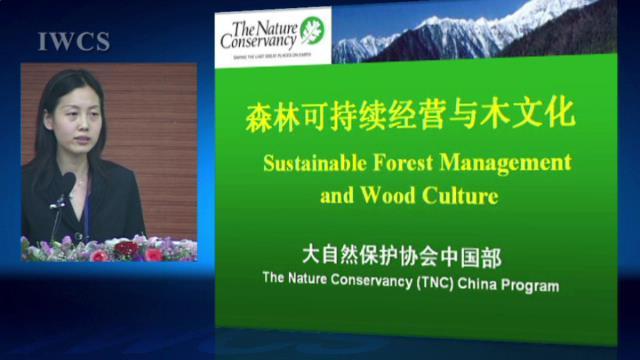会议名称:第二届木文化国际研讨会
会议时间:2007年5月28日-31日
会议地点:中国·南京
报告嘉宾:陈晓倩 博士 美国大自然保护协会(TNC)中国项目
报告摘要:森林兼具经济功能、生态功能与社会功能。森林可持续经营的目标是长期保持林地的生产力,维持森林的产品功能,服务功能和价值,并保持森林生物多样性,景观多样性和独特性。
中国的木文化源源流长,很早就意识到了木材作为重要的可再生资源的经济利用价值,同时也关注了木材产出的可持续性与保护森林作为生态系统一部分的景观与生物多样性的重要性。如何提高森林经营水平与能力,确保木材的可持续供给是传承中国传统木文化重要的基础与载体。在现代木文化的内涵中应加强合理、高效地利用木材、保护木材的观念,实现森林的经济功能与生态功能的统一,木材利用与保护的统一。
大自然保护协会(TNC)中国部致力于中国的生物多样性保护,于1998年开始在中国滇西北开展工作。目前绿色木材采购与森林可持续经营项目旨在确保中国木材进口的合法和可持续性,并促进国内木材合法持续供给。
Abstract: Forest combined economic, ecological and social functions. Objectives of Sustainable forest management including: maintaining long term productivity of forest land and maintaining forest' s ability on providing timber products and services, and also maintaining bio-diversity, landscape diversity and their unique features.
Wood culture has the long history in China, ancient people realized the economic utilization value, and also in considering the sustainable wood products output and forest bio-diversity conservation issue. Improving sustainable forest management ability, guaranteeing the sustainable timber supply are important base and carrier of Chinese traditional wood culture. We should also strengthen and incorporate effective and reasonable timber utilization concept into our modern wood culture, and promoting the unification between forest economic function and ecological function, and balancing timber utilization and protection.
The Nature Conservancy (TNC) China Program focused on bio-diversity conservancy in China, and began to work in Yunnan province in 1998. The Green Wood Procurement and Sustainable Forest Management project aimed to reduce the suspicious wood imported in China and catalyze legal and sustainable domestic wood supply.
责任编辑:iwcs24L


 720
720